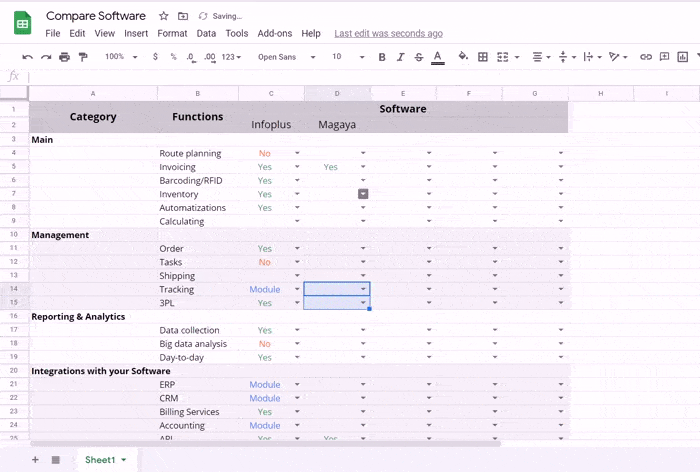
Logistics and warehousing platforms are becoming more and more critical in the fast-moving world we currently live in. Logistical and warehousing software can make or break a company. In many cases choosing the right enterprise-level logistical software package has a direct impact to the bottom line of a business that heavily relies on timely distribution, warehousing, and/or manufacturing. Today we’ll try to discuss different approaches in getting your warehouse and manufacturing floor to run as efficient as possible.
First thing first before you choosing logistic software
When thinking of the ideal solution for your organization you have to identify the level of automation in day-to-day operations and in data collection that you would like to see. It is one thing if you would like to do the next step up from a paper system, and simply utilize the computer to control your cargo tracking, truck logistics, control inventory levels, receive purchase orders, ship out process orders and control production tickets. Many modern systems do that quite effectively, but with different levels of user data input along each step. Entering sales order in an ERP system and then updating order in the system through each step if its lifetime gives the system sufficient visibility into your inventory. Now you should start thinking of how much tracking you want to do along each step of order lifetime and how much automation you want to see. For example, do you want to see the order as it is being picked? Or maybe how and where it is being staged on the floor? How about when it’s loaded to the truck or when it’s being delivered to your client? Are you tracking your internal sales order or for your third party client, for whom you warehouse the inventory?
Automation & Planning solutions for Logistics
Now let’s think about different levels of automation that you want to see. Do you want to automate your system to the point where it guides your pickers where to grab inventory and which item to grab (oldest first anyone)? How about having inventory scanned on the floor by the workers with a mobile device? Or let’s take it one step further, and imagine how RFID enabled software can have inventory scanned without users actually doing the scanning, automatically updating your inventory levels upon receipt or shipping. Or maybe we can dream up about robotic systems bringing the actual inventory to the staging location all on its own? This level of automation is what separates one modern logistical software, manufacturing solution, or warehouse management system from another.
Making the shopping list and compare software

Making a list of things that you’d need your systems to support that you cannot live without is the first thing to do. If, for example, you are in the 3PL (3rd party logistics) business, 3PL support must be front and center on your “must have” list, and so on. More often than not this list will become your module list, like Purchase order control, or manufacturing control, or labor tracking, and so on. Now, make a separate list of automation options that you’d like to see in your day to day operations. For example, if you need users to scan inventory on the floor – put mobile scanning under your “automation” list. This list may include POS (Point of Sale) terminals, RFID (Radio Frequency Identification) container tracking, motion automation for your conveyors or RFID gates, automated physical count systems, robotics and so on. It may also include things like automated ordering of inventory when they fall beyond certain levels, generation of intelligent pick lists and put away routes to optimize picking and/or put away in your warehouse, backflushing raw materials as work orders are produced, and so on.
Should I Buy Software for Logistics?
Best for small and medium-sized companies
Now, lets shop for the off-the-shelf logistical software solutions that closely fit both “must have” and “automation” lists. Is there a perfect fit between your budget and an off-the-shelf package that will meet your needs? Do not forget, when talking about budget, you need to take into account your “running” costs- yearly support fees, subscription fees, maintenance fees, as well as down time for patches, upgrades, etc. Finally, if there are any integrations that you’d need to have between your new logistical solution and other enterprise systems – look into what it takes to make that happen. Is there an off-the-shelf solution for integrating your accounting, ERP, CRM, e-commerce, and logistical software? If not – do your systems offer API’s (application programming interfaces) that will allow you or your implementation partner to perform these integrations?
Should I develop custom software instead of buying?
Great for enterprise companies
Another option altogether is to look at developing your ideal solution, either by yourself, or with the help of an implementation consultant. There are many software development companies out there that specialize in building software for logistics, either from the scratch, or starting with an open source logistical software as a starting point. Having a solution developed specifically for you gives you a great flexibility and will produce a solution with 100% fit for your needs. Do be careful, though, when identifying the budget for the project like this. The better you can outline your specifications for this ideal logistical system – the better the budgetary estimate you’ll receive.
Maybe a hybrid approach?
Excellent for companies who know what they need
If the logistical software of your choosing does not meet your criteria quite 100%, and development from the scratch is outside of your budgetary needs, maybe a hybrid approach is the way to go? How easily configurable and customizable your chosen solution is? Can you get to 100% of functionality by taking an existing logistical package and writing custom modules to extend its functionality? These types of questions can be quite complex, but if your implementation consultant and chosen software development team have experience in such projects, they can be answered with a good amount of certainty and provide you specific budgetary and timeline estimates.
In conclusion, bringing it all together
Choosing the right logistical and warehousing software is a critical step in the growth of your organization and it should not be taken lightly. Select your implementation consultant carefully, this individual will be responsible for documenting your needs, your wants, and his competence will be the deciding factor in the success of this endeavour. Shop for a software development team with great care. You need to be 100% confident that the development partner of your choice can deliver on your vision, within your budget, on an agreed timeline, and within the specifications outlined by your consultant. Check out the portfolio of the developers – have they done software for logistics solutions before? Have they worked with your ERP or accounting software? Have they done successful projects utilizing technologies or platforms that you or your consultant insists upon? Ask many questions, carefully document your requirements as well as each step of the project, make calculated selections for your development team, and you’ll succeed in executing your vision perfectly.
Good luck.
Greg Reznik,
President at FiduciaSoft
Linkedin profile
